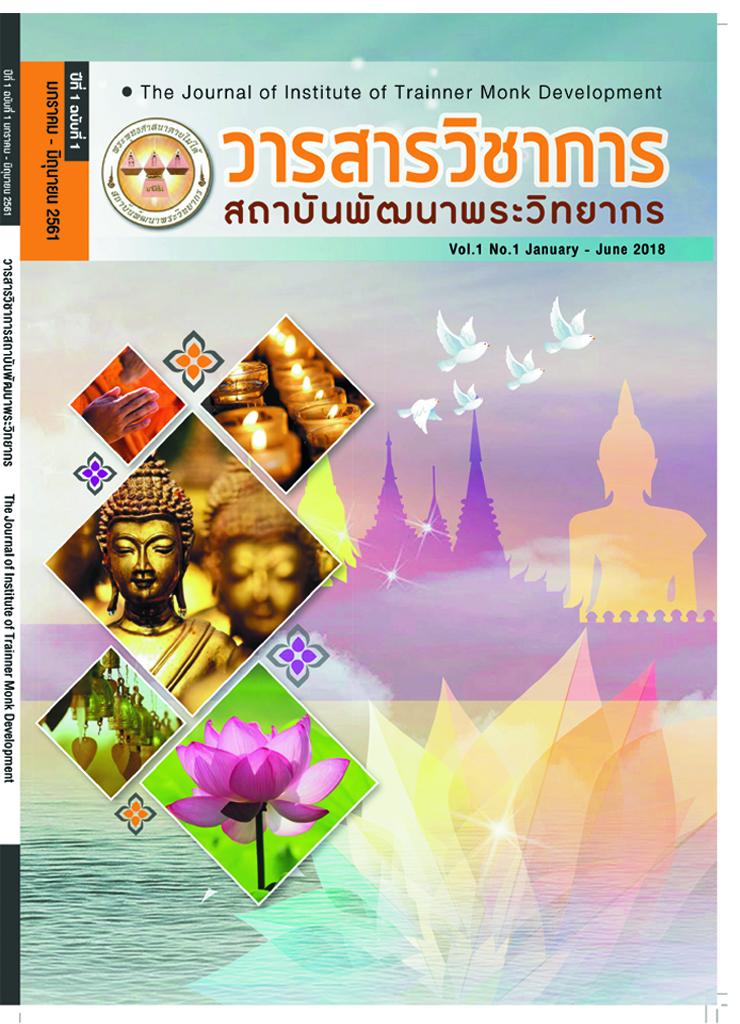LEARNING PROCESS OF GROUP BEHAVIOR ON AWAKENING IN BUDDHIST PSYCHOLOGY
Main Article Content
Abstract
The aim of this research is 1) to study of learning model of group behavior on awakening in religious psychology 2) to synthesize the learning model of group behavior on awakening in buddhist psychology and 3) to process a learning model of group behavior on awakening in Buddhist Psychology. The resources were referred from the Tripitaka, Commentaries and the same field researches which run by material analyzing and synthesizing. The result of research finds that; Learning along the western concept is a modular nature and human behavior. This is the basis of learning theory. Learning means to change behavior in a way better experience as a result of the emphasis on behavior change that can modify or face problems. The goal of learning is to develop a relationship with an object to satisfy their needs in life. To learn along the Buddhist concept is seen as a part of human nature. This is a fundamental doctrine in Buddhism learning along Buddhism refers to the practice of human life must be pretty good. Emphasis on human development and behavior, mind and intellect. The goal is an understanding of what it is and is associated with the natural reality. Able to develop their independence from their suffering has finally become a complete human being. Learned behavior of human beings according to Theravada Buddhism. A preliminary stages Start by faith or confidence that such enterprises are wise to listen to any material representations as reliable, or are confident that led to the truth. I started learning from them. Faith must include the intelligence gained to become a quality viewpoint. Factors that contribute to the goodwill gained a viewpoint which is external factors. The quest for knowledge, good friendly advice to get knowledge. hen, the information Who heard the screening analysis with reflective thinking. The internal factors of male practice itself. At this stage, it can be said that. When a person has already Yonisomanasikara Samma viewpoint, it would happen by then led into a self-learning process by acting as the Noble Eightfold Path has eight or learning process by threefold. External and internal factors are equally important or said that human life will be complete when the human relationships at three aspects of behavior and mental faculties. Enlightenment were comparable to the Buddha that Atari Teenage in Allah Chart Nova conscious society, awakening residents to raise the self of the community into the cultural consciousness (up to the pan) rich social intelligence (the rulers). the share of the economy (Aolpa) and the politics of compassion (the anger) enlightenment by pleasing perseverance. Knowing clearly and knowingly in their group.
Article Details
บทความที่ได้รับการตีพิมพ์เป็นลิขสิทธิ์ของวารสารวิชาการสถาบันพัฒนาพระวิทยากร
ข้อความที่ปรากฎอยู่ในบทความที่ได้รับการตีพิมพ์ในวารสาร ถือเป็นความรับผิดชอบของผู้เขียนบทความ และข้อคิดเห็นนั้นไม่ถือว่าเป็นทัศนะและความรับผิดชอบของกองบรรณาธิการวารสารวิชาการสถาบันพัฒนาพระวิทยากร
References
นวลศิริ เปาโรหิตย์. (2554). จิตวิทยาเบื้องต้น. พิมพ์ครั้งที่ 13. มหาวิทยาลัยรามคำแหง: สำนักพิมพ์ มหาวิทยาลัยรามคำแหง.
พระอภัย อภิชาโต (ชูขุนทด) (2554). “การศึกษาหลักธรรมสำหรับพัฒนาพฤติกรรมของมนุษย์ในสังคมปัจจุบัน”. วิทยานิพนธ์พุทธศาสตรมหาบัณฑิต. บัณฑิตวิทยาลัย: มหาวิทยาลัยมหาจุฬาลงกรณราชวิทยาลัย.
รสสุคนธ์ ยมกนิษฐ์. (2553) “ศึกษากระบวนการเรียนรู้ตามแนวพระพุทธศาสนา”. วิทยานิพนธ์พุทธศาสตรมหาบัณฑิต. บัณฑิตวิทยาลัย: มหาวิทยาลัยมหาจุฬาลงกรณราชวิทยาลัย.
Edgar H. Schein. (1969). Organization Psychology. New york: Prentice-Hall Inc.
Homans, Georgeg. (1950). The Human Group. New york: Harcourt Brace Jovnovich.


